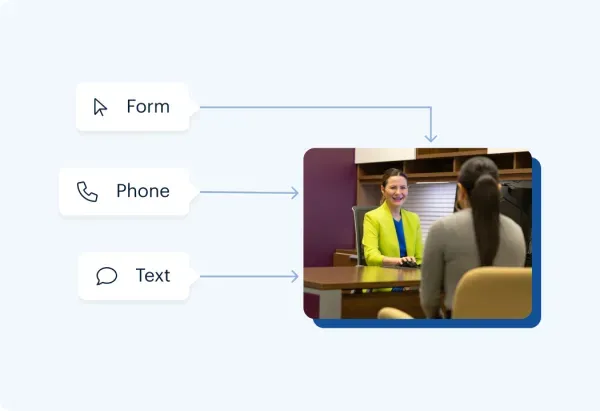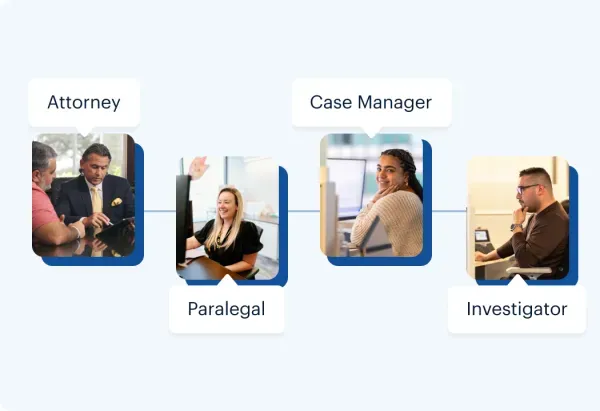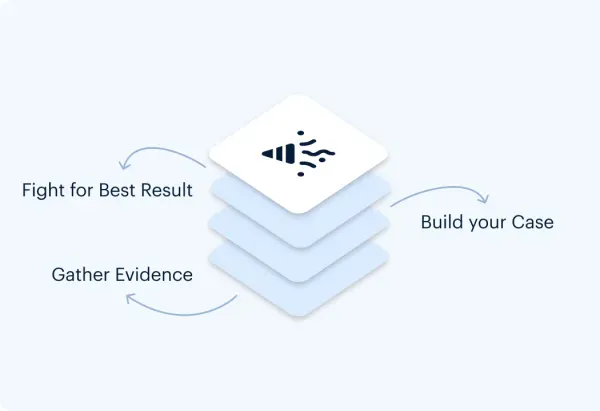Cases will be handled by attorneys licensed in the local jurisdiction. Cases may be associated with, or referred to, other law firms as co-counsel or referral counsel. Results may vary depending on your particular facts and legal circumstances. The attorney featured above is licensed in Florida. For a full list of attorneys in your state please visit our attorney page.
CHARLOTTE MARITIME ATTORNEY
Maritime jobs, from shipyards to offshore work, carry unique risks, and injuries fall under complex federal laws like the Jones Act or the Longshore and Harbor Workers’ Compensation Act (LHWCA). If you’ve been hurt in a maritime incident, a Charlotte maritime attorney can help you navigate your rights and pursue compensation.
Cases will be handled by attorneys licensed in the local jurisdiction. Cases may be associated with, or referred to, other law firms as co-counsel or referral counsel. Results may vary depending on your particular facts and legal circumstances. The attorney featured above is licensed in Florida. For a full list of attorneys in your state please visit our attorney page.
Charlotte, NC Maritime Lawyers
Experiencing an injury is always stressful but going through that when you are at sea or in a place that is governed by maritime law can make the situation even more difficult. Maritime law is quite complex, and not every lawyer is well-versed in this area of law. It’s incredibly important to find a lawyer who has experience specifically in that area to ensure that you’re able to obtain the justice and compensation you deserve. If a worker is injured on the job in a location that is governed by maritime law, they will be able to pursue benefits by utilizing a process similar to a typical personal injury claim, as there is no workers’ compensation available in these scenarios. If you believe you are entitled to compensation under maritime law, contact an attorney right away. The Charlotte, NC maritime lawyers at Morgan & Morgan are experienced in handling all types of maritime cases and will do whatever it takes to ensure you get what you’re entitled to. Contact us today to schedule a free and confidential consultation.
150,000+ Five Star Reviews
The reasons why clients trust Morgan & Morgan.
Results may vary depending on your particular facts and legal circumstances. Based on select nationwide reviews.
What types of workers does maritime law cover?
When most people think of maritime law, they picture sailors and commercial fishermen. However, the truth is that maritime protections extend to a wide variety of workers, many of whom never set foot on the open ocean.
Under the Jones Act, “seamen” who spend at least 30% of their time working aboard a vessel in navigation are entitled to pursue claims against their employers if injured due to negligence. A vessel doesn’t have to be at sea; it can be docked or operating in navigable inland waters, such as connected lakes and rivers. Tugboats, barges, cruise ships, oil rigs, and even permanently anchored casino boats can all meet the legal definition of a “vessel.”
For those who don’t meet the definition of a seaman, including shipyard workers, harbor workers, and others who support maritime operations on land, the LHWCA provides a separate but equally important path to compensation. This program functions similarly to workers’ compensation and is designed to protect those who handle cargo, maintain vessels, or work in longshore roles.
What types of injuries fall under maritime law?
Injuries in the maritime world can be catastrophic and occur more frequently than most realize. Unsafe conditions on vessels or docks, untrained crew members, outdated equipment, and even employer recklessness can lead to life-changing harm.
Common injuries include:
- Head trauma from falling tools or slippery decks
- Burns from engine room accidents or fuel fires
- Spinal injuries caused by rough seas or unsafe machinery
- Crushing injuries from cargo mishandling or shifting loads
- Repetitive motion injuries from long-term labor in tight spaces
- Psychological injuries, such as PTSD from traumatic shipboard events
Maritime law allows injured parties to seek damages for medical care, lost wages, loss of earning capacity, pain and suffering, and in some cases, punitive damages if employer negligence was especially egregious.
How does the Jones Act protect injured seamen?
The Jones Act is one of the most powerful tools for injured maritime workers. Unlike standard workers’ compensation, it allows eligible employees to sue their employers for negligence directly. This includes failures to maintain a safe vessel, lack of proper safety gear, inadequate training, or allowing dangerous working conditions to persist.
To bring a successful claim under the Jones Act, injured seamen must show:
- They are legally considered a “seaman”.
- The vessel was in navigation at the time the injury occurred.
- The employer was negligent in some way.
- That negligence, however slight, contributed to their injury.
The burden of proof is lower than in most personal injury cases. Even if multiple factors contributed to the injury, as long as employer negligence played any role, compensation may still be available.
What does “vessel in navigation” mean?
A surprising number of maritime cases hinge on whether the vessel was “in navigation” at the time of the incident. This doesn’t mean the ship has to be sailing; it just needs to be afloat, capable of movement, and operating in navigable waters.
A docked but operational supply ship qualifies. A casino boat permanently anchored in a river may also count. However, a ship in dry dock undergoing maintenance generally won’t meet the criteria.
If you were injured aboard a vessel that fits these standards, even if it was stationary, your claim could still fall under maritime law.
How does comparative fault affect maritime claims?
Even if you were partially responsible for your own injury, you may still be entitled to compensation. Under maritime law, including the Jones Act, courts apply comparative negligence standards. That means your percentage of fault may reduce your compensation, but you won’t be barred from recovery entirely.
For example, if a court finds you 20% at fault and awards $100,000 in damages, you’d still recover $80,000. This flexibility is one reason why it’s important not to assume fault will prevent you from pursuing a claim.
What are the legal protections for dockworkers and longshore employees?
Not everyone in the maritime industry works aboard ships. If you were injured while loading cargo, repairing ships, transporting materials, or supporting marine operations from the shore, the Longshore and Harbor Workers’ Compensation Act (LHWCA) may apply instead.
Unlike the Jones Act, the LHWCA functions more like workers’ compensation and doesn’t require proof of employer negligence. It offers wage replacement, medical care, and permanent disability benefits, as well as survivor benefits for families in the event of a fatal case. If your job ties directly to maritime operations, even if you're not a seaman, you may qualify.
How do I preserve evidence after a maritime injury?
Maritime injury cases often come down to evidence: what happened, why, and who is responsible. If you’re hurt at sea or on the job, preserving your right to compensation means taking swift and careful steps. These include:
- Reporting the injury immediately to your supervisor or captain
- Seeking medical treatment and keeping all records
- Documenting the scene and your injuries with photos or videos
- Requesting a copy of any incident reports
- Speaking to witnesses while details are still fresh
- Avoiding signed statements or settlements before legal review
Because maritime law operates under federal statutes, your case may involve different timelines and procedures than typical state-based injury claims.
Why does experience matter in maritime law?
Injury claims involving maritime law require deep knowledge of both federal legislation and specific eligibility criteria. Not every attorney understands the nuances of the Jones Act, the LHWCA, or what makes a vessel “in navigation.” That’s why working with a firm experienced in maritime litigation is critical.
Morgan & Morgan’s maritime attorneys are licensed to practice in North Carolina and have extensive experience handling seaman claims, dockworker claims, and maritime personal injury lawsuits nationwide. We understand the challenges of proving negligence in water-related incidents, and we have the resources to take on employers, vessel owners, and insurance companies that attempt to evade responsibility.
When should I call a maritime injury lawyer in Charlotte?
Maritime law is complicated. Your right to compensation shouldn’t be.
If you or a loved one has been injured aboard a vessel or while performing maritime work, don’t try to handle the legal maze on your own. Let Morgan & Morgan fight for the compensation you deserve. We’ve recovered billions for injured clients, and we’re ready to stand up for you.
There’s no cost to get started, and no fees unless we win. Schedule a free case evaluation today to speak with a maritime attorney who understands what you’re up against.
Our Results
How It Works
Unsure what to do next? With 35 years of experience, our personal
injury lawyers will guide you every step of the way.

Contact Us 24/7 - It’s Free
Start your claim

Meet your dedicated attorney
Meet the attorneys

We fight for more
Learn more about the case process
Results may vary depending on your particular facts and legal circumstances. The attorneys shown in these photos may not be licensed in your state. To find an attorney licensed in your area, please visit our attorney page.
Local Care
Backed by America’s Largest Injury Law Firm.
$30 Billion
Recovered for clients
nationwide700,000+
Clients and families
served1,000+
Attorneys across
the country1
Click may change your life
The attorney featured above is licensed in Florida. For a full list of attorneys in your state please visit our attorney page.
Results may vary depending on your particular facts and legal circumstances.
Learn More
Injured and not sure what to do next?
We'll guide you through everything you need to know.








